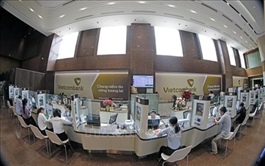Policies need to be amended to promote microfinance
Policies need to be amended to promote microfinance
Microfinance has made remarkable developments and contributed significantly to poverty reduction and financial inclusion promotion in Việt Nam, but some policies should be further amended to encourage all social resources to participate in the sector, experts said on Friday.

Attendees at the event heard that Việt Nam has 79 microfinance programmes and projects that have been granted registration licences by the SBV. — Photo thoibaonganhang.vn |
At an event on microfinance for promoting financial inclusion held in Hà Nội on Friday, the Deputy Governor of the State Bank of Vietnam (SBV) Đào Minh Tú said Việt Nam currently had four microfinance institutions with total assets of VNĐ10.38 trillion and 500,000 customers. The country had 79 microfinance programmes and projects which had been granted registration licences by the SBV.
However, Tú noted, the operational scale of the microfinance sector in Việt Nam was still quite small and did not match the development potential.
According to experts, the sector is also facing some difficulties. Specifically, the capital increase of microfinance institutions remains limited because the current policies cannot encourage all social resources to participate in microfinancing activities.
Some regulations are not consistent, causing difficulties in the operation process of the institutions. Accordingly, there are currently no unified regulations on microfinance customers while regulations on owners and founding members of microfinance institutions are still quite strict. In addition regulations on loan procedures, credit approval and loan use for microfinance institutions, are the same as those for commercial banks.
According to experts, to help microfinance play a bigger role in promoting financial inclusion in Việt Nam, it is necessary to continually review and streamline the microfinance legal framework.
It is necessary to issue a unified regulation on microfinance customers in accordance with the provisions of the amended Law on Credit Institutions. The Government should also amend the regulation on capital contribution members of microfinance institutions, so that it is not a requirement to be part of a political organisation or a socio-political organisation to take part.
There need to be plans to improve the operating capacity of microfinance institutions, microfinance programmes and projects through capital increase from equity, domestic and foreign investors and bond issuance.
In particular, microfinance institutions need to increase the application of technology in product development and diversification, along with promoting cooperation with commercial banks and financial technology organisations to enhance the application of such technologies, such as SMS banking, home banking and mobile banking, to make them even more convenient for customers.
Experts also believe that it is necessary to strengthen education and communication in terms of financial understanding for customers, so they can effectively manage and use these kinds of financial resources and achieve sustainable financial goals.
























